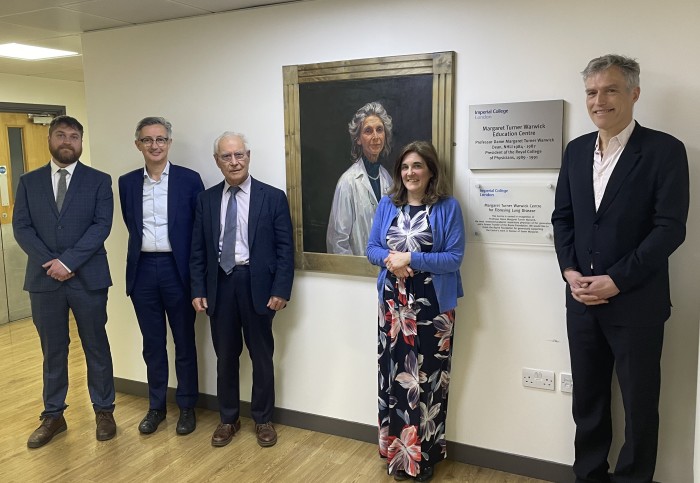Plaque unveiled celebrating the legacy of Professor Dame Margaret Turner Warwick

From L-R: Dr Iain Stewart, Crispin Truman, Emeritus Professor Sir Anthony Newman Taylor, Susan O'Sullivan and Professor Gisli Jenkins
Imperial welcomes the Rayne Foundation to the College to celebrate the naming of the new Centre for Fibrosing Lung Disease in her honour.
Members of the Centre’s team were delighted to host the foundation’s Director, Crispin Truman, and Head of Grants, Susan O’Sullivan, to unveil the plaque and learn more about the Centre’s work.
Thanks to a generous £300,000 donation, the Rayne Foundation have helped to establish the new Centre which will advance research into fibrotic lung disease, the field to which Professor Dame Margaret Turner Warwick dedicated her extensive career.
“Dame Margaret was a valued and long-serving member of the Rayne Foundation’s trustee board. We are delighted to support this vital centre in celebration of her distinguished career as a thoracic physician and the significant discoveries she made to improve the understanding and treatment of lung diseases”, Crispin Truman said.
The Foundation’s gift will fund the work of the Rayne Foundation Advanced Research Fellow, Dr Iain Stewart, who is leading the Centre’s Biostatistics and Bioinformatics team.
"With this support we will be able to make a difference to the lives of people with pulmonary fibrosis" Professor Gisli Jenkins
Professor Gisli Jenkins, the Margaret Turner Warwick Chair in Thoracic Medicine and the Head of the Centre, said: "We are grateful and delighted that the Rayne Foundation has been able to honour Dame Margaret's legacy in such a positive way and with this support we will be able to make a difference to the lives of people with pulmonary fibrosis".
A new home for vital research
Launched in 2021, the Margaret Turner Warwick Centre for Fibrosing Lung Disease is the first centre dedicated to the study of fibrotic lung disease in the UK, filling a key national leadership gap in the innovation pathway for this condition.
Hosted within the National Heart and Lung Institute at Imperial College London, the centre will work closely with the Interstitial Lung Disease unit at the Royal Brompton Hospital; the largest unit in the UK dedicated to the management of patients with fibrosing lung disease.
Improving outcomes for fibrotic lung disease
Fibrotic lung disease is a chronic condition in which the lungs become scarred and breathing becomes increasingly difficult. Currently over 5,000 new cases are diagnosed a year – six times more than 40 years ago. With a median survival of three to five years post-diagnosis, the prognosis for this condition is worse than most cancers.
The vision of the Margaret Turner Warwick Centre is to change this outcome for patients with fibrotic lung disease by finding a cure through improved understanding of disease biology. The Centre will achieve this through an extensive research programme that will identify people at risk of developing progressive pulmonary fibrosis; map molecular pathways that can be modified to treat pulmonary fibrosis; generate biomarkers to predict the risk of disease progression; and develop new, safe and tolerable therapies that can reverse early lung injury or prevent the development of progressive disease altogether.
"I am honoured to be following in the footsteps of Dame Margaret." Dr Iain Stewart
As the Margaret Turner Warwick Centre’s analytical and statistical lead, Dr Stewart will support this vision through the application of advanced statistical methods to help identify important features that can improve our understanding of the disease, as well as potential targets to support efficient diagnosis and therapies.
Dr Stewart said: “I am grateful to the Rayne Foundation for kindly supporting my research and honoured to be following in the footsteps of Dame Margaret. Her impressive work has paved the way for the discoveries of the future and the Margaret Turner Warwick Centre team look forward to continuing her mission.”
Pioneering physician
Professor Dame Margaret Turner Warwick was one of the world's leading thoracic physicians. She strongly believed in the partnership between research and clinical work and undertook important research on pulmonary fibrosis, establishing a clinical interest in interstitial lung disease, autoimmunity in the lung, and asthma.
Dame Margaret was head and dean of the Cardiothoracic Institute (1984-1987), which became the National Heart and Lung Institute and later incorporated into Imperial College London. After a very distinguished career, she retired from this post in 1987 and was then elected as the first-ever female president (1989-1992) of the Royal College of Physicians in London in its 500-year history. Dame Margaret was later chairman of the Royal Devon and Exeter Health Care NHS Trust (1992-95).
Article text (excluding photos or graphics) © Imperial College London.
Photos and graphics subject to third party copyright used with permission or © Imperial College London.
Reporter
Clare Olding
Advancement
Joely Langston
Advancement